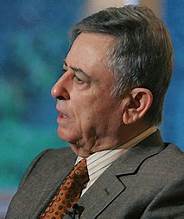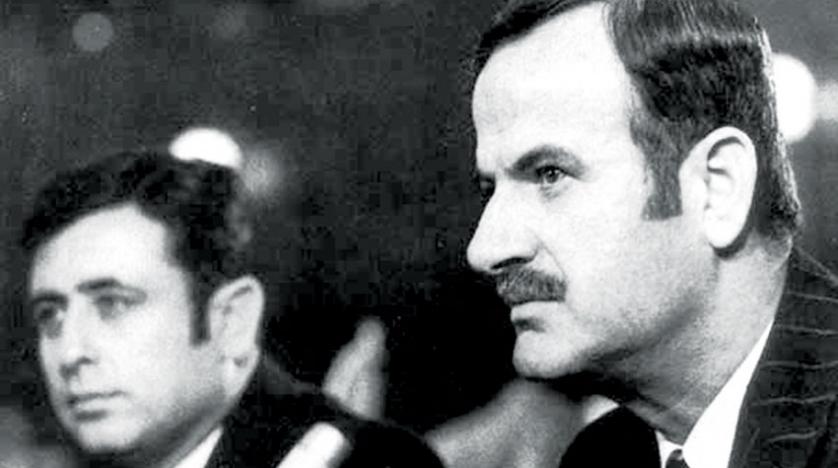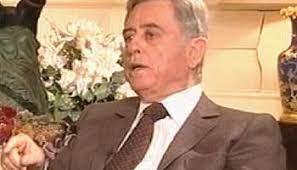He said that Hafez al-Assad used to call Saddam Hussein a dictator and a butcher.
Inside his house near the Arc de Triomphe in the heart of the French capital, Paris, “Al-Massaa” met with Abdul Halim Khaddam… One of the most knowledgeable about the secrets of the Syrian file, as he was the one who accompanied Presidents Hafez and Bashar al-Assad as their deputy and minister of foreign affairs, responsible for two of the most dangerous and mysterious files in the Middle East: the Lebanese and Iraqi files.
Abdul Halim Khaddam, seated in front of “Al-Massaa,” revealed secrets about his relationship with the father and son’s regime “drowned in corruption and tyranny”; he talked about Hafez al-Assad’s obsession with passing on power to his family members, and how Bashar al-Assad sought his company, where he began to criticize his father’s regime, and he used to call him “Uncle Abdul Halim.” He also recalled the moment when he found himself as the president of the republic after Hafez al-Assad’s death, and the behind-the-scenes adjustments of the constitution to make Bashar the president of the country, and how he decided to leave Syria and turn into the biggest enemy of the regime, planning to establish a state on the coast where the majority of Alawites, to which the Assad family belongs, reside. Abdul Halim Khaddam also talked about his relationship with King Hassan II and Mehdi Ben Barka, and how the Syrian position changed regarding the Sahara issue, stating that Algerian President Abdelaziz Bouteflika did not get rid of the mentality of his predecessor, Houari Boumediene.
- When King Hassan II visited Syria, he refused to pray in the Umayyad Mosque, justifying that he could not pray in a mosque where his grandfather, Ali ibn Abi Talib, was insulted; tell us about the details of this incident?
I do not recall this incident, as the visit took place fifty years ago. However, during the Umayyad Caliphate, this kind of exchange occurred between Ali’s Shia supporters and Muawiya’s followers, with mutual insults. If we go back to that period, we will find thousands of fabricated stories insulting Ali and thousands of fabricated stories insulting Muawiya. Yes, Ali ibn Abi Talib was insulted, and he was even called “Abu Turab” (Father of Dust).
- The French journalist Éric Laurent, quoting King Hassan II, reported that during a conference in Fes in 1982, Saddam Hussein turned to Hafez al-Assad and said to him, “How many times have you tried to overthrow me, my friend?” and al-Assad replied, “I know this, but in turn, I have done my best to eliminate you.”
Yes, this happened in a closed session between the leaders, and Hafez al-Assad told me about it. And that’s the truth. We made every effort to overthrow the Saddam Hussein regime, and Saddam made every effort to overthrow the regime in Syria.
- What did Hafez al-Assad used to say about Saddam Hussein?
Saddam Hussein was a rival, Saddam used to demand the downfall of Hafez al-Assad, and Hafez al-Assad used to demand the downfall of Saddam.
- What was the most significant term that Hafez al-Assad used to describe Saddam Hussein?
He used to call him a dictator and a butcher. And of course, the animosity was mutual between them.
- On the day Saddam Hussein was captured, where were you, and how did you react to the media image that portrayed his arrest?
I was at my home in Syria. I believe that discussing the deceased is not productive. Saddam engaged in an unequal war and lost it. He had to bear responsibility for it. He had engaged in a previous war against Iran and then invaded Kuwait. Anyway, he was a risk-taker.
- Saddam’s trial and execution, how did you perceive that?
It was a natural course of events. After being defeated, it was the turn of those who took power after him to hold him accountable, just as he used to hold them accountable.
- Was this accountability fair?
Is there any fair accountability in such situations?
- In the year 2000, it was said that Mahmoud Al-Zoubi, the Prime Minister of Syria, committed suicide after being compelled into forced residence. Did Al-Zoubi commit suicide or was he killed?
- Mahmoud Al-Zoubi committed suicide.
- What is your evidence that he committed suicide?
- He informed me that he would commit suicide, just as he informed General Hikmat Al-Shihabi about it. After Al-Zoubi was expelled from the party and it was decided to investigate him, he told me that he had informed the president that if they were to interrogate me, I would commit suicide.
- What did you say to him?
- I told him, “You are accused in several cases, so defend yourself. If you have information about other involved individuals, speak up, or remain silent.” I went back home and called him again, and he asked me if I had informed the president about what he had said to me. I denied it, and he repeated his previous statement: “If they interrogate me, I will commit suicide.” I added, “If you ascend to the sky and find no one but yourself, commit suicide and come back.”
- Were you joking with him?
- No, I was speaking seriously.
- Why would he commit suicide?
- After that, he contacted General Hikmat Al-Shihabi again and asked him for the same thing, which is to inform the president. Al-Shihabi responded that he would not do that. The next day, a security patrol went to arrest him at his home. He asked the patrol for a chance to change his clothes. His house had two floors, so he went to the second floor, picked up a gun, and shot himself in the head.
- In the same year you decided to leave the regime, the Syrian Minister of Interior Ghazi Kanaan announced his suicide?
- No, that happened after I had left Syria by a few months.
- Did Ghazi Kanaan commit suicide or was he killed?
- I cannot judge, and I do not have information. However, Ghazi Kanaan was in a difficult situation. He was summoned to appear before the investigation committee regarding Hariri’s assassination and forgot that he was a security officer. He spoke about matters that could harm the regime. Bashar al-Assad summoned him and addressed him harshly.
- What did he say to him?
- I was not present.
- What information did you receive about what he said to him?
- There is an account that was circulated by his relatives, which means that Bashar al-Assad told him, “Arrange yourself or we will arrange you.”
- Does that mean commit suicide or we will kill you?
- Yes, it implies commit suicide or we will kill you. However, the leaked account is that Ghazi Kanaan went to his house, took his gun, and shot himself.
- What do you personally believe, did Ghazi Kanaan commit suicide or was he assassinated?
- He was under the sentence of death, so the possibility of suicide is likely, and the possibility of assassination is also likely.
- Ghazi Kanaan’s death came after his testimony in the Hariri case, meaning after he chose to stand on the opposing side of the regime?
- There is no Syrian who is not opposed to the Assad regime, but some oppose and keep it hidden, while others let their words slip.
- What do you personally remember about Ghazi Kanaan?
- Ghazi Kanaan began his career as a security officer in Homs, then he was transferred to Lebanon. His direct connection was with Hafez al-Assad, not the Chief of Staff or the Minister of Defense. He used to submit daily reports to Hafez al-Assad about the situation in Lebanon. These reports were sent to us, those responsible for the Lebanese file, by Hafez al-Assad, and sometimes they didn’t reach us.
- Did Ghazi Kanaan ever complain to you about Bashar al-Assad’s regime?
- Yes, we were friends, and we used to meet for lunch or dinner. All of us used to complain..



